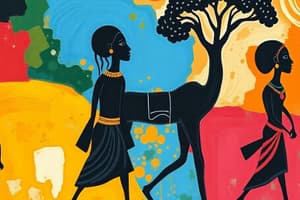Podcast
Questions and Answers
What common associations are made with women in African societies?
What common associations are made with women in African societies?
Women are often associated with fertility, nurturing, and domesticity.
How are gender roles in African societies influenced?
How are gender roles in African societies influenced?
Gender roles are influenced by ethnicity, socioeconomic status, urban vs. rural settings, and the impacts of colonialism and globalization.
What does it mean that gender is culturally constructed in African societies?
What does it mean that gender is culturally constructed in African societies?
It means that gender roles and expectations are shaped by cultural norms, values, and beliefs rather than being solely biologically determined.
In some societies, what role do women hold regarding family and community?
In some societies, what role do women hold regarding family and community?
How do power dynamics between men and women manifest in African societies?
How do power dynamics between men and women manifest in African societies?
Can you name examples of women who hold significant power in African societies?
Can you name examples of women who hold significant power in African societies?
What impact has colonization had on gender roles in African societies?
What impact has colonization had on gender roles in African societies?
How has globalization affected women's economic empowerment in African societies?
How has globalization affected women's economic empowerment in African societies?
Flashcards are hidden until you start studying
Study Notes
Gender Roles in African Societies
- Gender roles vary across African societies, but some common patterns exist:
- Women are often associated with fertility, nurturing, and domesticity.
- Men are often associated with strength, protection, and authority.
- However, these roles are not universal and can be influenced by factors such as:
- Ethnicity
- Socioeconomic status
- Urban vs. rural settings
- Colonialism and globalization
Cultural Construction of Gender
- Gender is culturally constructed in African societies, meaning that:
- Gender roles and expectations are shaped by cultural norms, values, and beliefs.
- Gender is not solely determined by biological sex.
- Examples of cultural construction of gender:
- In some societies, women are considered "mothers of the nation" and are expected to prioritize family and community over individual goals.
- In other societies, men are expected to prioritize economic productivity and provision over emotional expression and nurturing.
Gender and Power Dynamics
- Gender is closely tied to power dynamics in African societies:
- Men often hold more power and authority in public and political spheres.
- Women often have more influence in domestic and community spheres.
- However, there are also examples of women holding significant power and authority, such as:
- Queen mothers in some West African societies
- Female chiefs and elders in some East African societies
Impact of Colonization and Globalization
- Colonization and globalization have had a significant impact on gender roles and expectations in African societies:
- Western ideals of gender equality and women's empowerment have been imposed on African societies, often disregarding local cultural norms and values.
- Global economic systems have created new opportunities for women's economic empowerment, but have also exacerbated gender-based inequalities.
Contemporary Issues and Debates
- Some contemporary issues and debates surrounding gender and culture in African societies include:
- The role of gender in African feminism and women's movements
- The impact of religious fundamentalism on women's rights and gender equality
- The relationship between gender, culture, and HIV/AIDS prevention and treatment
Gender Roles in African Societies
- Gender roles exhibit variability across different African societies with shared patterns.
- Women's roles often encompass fertility, nurturing, and domestic responsibilities.
- Men's roles are typically connected with strength, protection, and authority.
- Factors influencing these roles include ethnicity, socioeconomic status, urban versus rural living, and historical contexts such as colonialism and globalization.
Cultural Construction of Gender
- Gender in African societies is shaped by cultural norms and beliefs rather than biological sex alone.
- Some societies view women as "mothers of the nation," emphasizing familial and communal responsibilities over individual aspirations.
- Conversely, in certain cultures, men prioritize economic productivity, often sidelining emotional expression and nurturing roles.
Gender and Power Dynamics
- Power dynamics in African societies are closely tied to gender roles.
- Men generally command more power and influence in public and political arenas.
- Women tend to exert greater influence in domestic and community settings, albeit with exceptions.
- Notable examples include powerful women such as queen mothers in West Africa and female chiefs or elders in East Africa.
Impact of Colonization and Globalization
- Colonization and globalization significantly reshaped gender roles and expectations within African contexts.
- Western notions of gender equality and women's empowerment often clash with local traditions and beliefs.
- Global economic changes create new opportunities for women's economic empowerment while also intensifying existing gender inequalities.
Contemporary Issues and Debates
- Current discussions on gender in Africa revolve around significant themes, including:
- The role of gender within African feminism and women's movements.
- The effects of religious fundamentalism on women's rights and gender equality.
- The intersections of gender, culture, and issues such as HIV/AIDS prevention and treatment strategies.
Studying That Suits You
Use AI to generate personalized quizzes and flashcards to suit your learning preferences.




